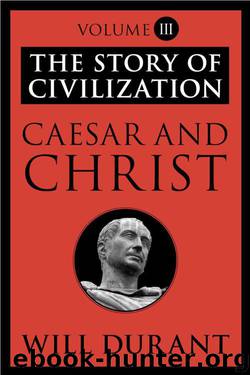Caesar and Christ by Durant Will

Author:Durant, Will [Durant, Will]
Language: eng
Format: epub, mobi
Publisher: Simon & Schuster
Published: 2011-06-03T20:00:00+00:00
III. THE LAW OF PERSONS
“All law,” says the precise Gaius, “pertains to persons, to property, or to procedure.”3 The word persona had signified an actor’s mask; later it was applied to the part played by a man in life; finally it came to mean the man himself—as if to say that we can never know a man, but only the parts he plays, the mask or masks that he wears.
The first person in Roman law was the citizen. He was defined as anyone who had been accepted into a Roman tribe by birth, adoption, emancipation, or governmental grant. Within this franchise were three grades: (1) full citizens, who enjoyed the fourfold right of voting (ius suffragii), of holding office (ius honorum), of marriage with a freeborn person (ius connubii), and of engaging in commercial contracts protected by Roman law (ius commercii); (2) “citizens without suffrage,” who had the rights of marriage and contract, but not of voting or office; and (3) freedmen, who had the rights of voting and contract, but not of marriage or office. The full citizen had, furthermore, certain exclusive rights in private law: the power of the father over his children (patria potestas), of the husband over his wife (manus), of an owner over his property, including his slaves (dominium), and of a freeman over another by contract (mancipium). A kind of potential citizenship, called Latinitas or ius Latii, was conferred by Rome upon the free inhabitants of favored towns and colonies, whereby they acquired the right of contract, but not of intermarriage, with Romans, and their magistrates received full Roman citizenship upon completing their terms of office. Each city of the Empire had its own citizens and conditions of citizenship; and by a unique tolerance a man might be a citizen—and enjoy the civic rights—of several cities at once. The most precious privilege of a Roman citizen was the safeguarding of his person, property, and rights by the law, and his immunity from torture or violence in the trying of his case. It was the glory of Roman law that it protected the individual against the state.
The second person in Roman law was the father. The patria potestas had been weakened by the spread of law into areas formerly governed by custom; but we may judge its surviving force from the fact that when Aulus Fulvius set out to join Catiline’s army, his father called him back and put him to death. In general, however, the power of the father declined as that of the government rose; democracy entered the family when it left the state. In the early Republic the fathers had been the state; the family heads formed the Curial Assembly, and the clan heads probably constituted the Senate. Rule through family and clan diminished as population became more abundant and diverse, and life more mobile, commercial, and complex; kinship, status, and custom were replaced by contract and law.4 Children won greater freedom from their parents, wives from their husbands, individuals from their groups.
Download
This site does not store any files on its server. We only index and link to content provided by other sites. Please contact the content providers to delete copyright contents if any and email us, we'll remove relevant links or contents immediately.
| Buddhism | Christianity |
| Ethnic & Tribal | General |
| Hinduism | Islam |
| Judaism | New Age, Mythology & Occult |
| Religion, Politics & State |
Cecilia; Or, Memoirs of an Heiress — Volume 1 by Fanny Burney(32549)
Cecilia; Or, Memoirs of an Heiress — Volume 2 by Fanny Burney(31948)
Cecilia; Or, Memoirs of an Heiress — Volume 3 by Fanny Burney(31932)
The Secret History by Donna Tartt(19058)
Sapiens: A Brief History of Humankind by Yuval Noah Harari(14371)
Leonardo da Vinci by Walter Isaacson(13319)
The Radium Girls by Kate Moore(12019)
Sapiens by Yuval Noah Harari(5366)
How Democracies Die by Steven Levitsky & Daniel Ziblatt(5216)
The Wind in My Hair by Masih Alinejad(5092)
Homo Deus: A Brief History of Tomorrow by Yuval Noah Harari(4909)
Endurance: Shackleton's Incredible Voyage by Alfred Lansing(4770)
Man's Search for Meaning by Viktor Frankl(4586)
The Silk Roads by Peter Frankopan(4526)
Millionaire: The Philanderer, Gambler, and Duelist Who Invented Modern Finance by Janet Gleeson(4469)
The Rape of Nanking by Iris Chang(4203)
Joan of Arc by Mary Gordon(4103)
The Motorcycle Diaries by Ernesto Che Guevara(4090)
Stalin by Stephen Kotkin(3958)
